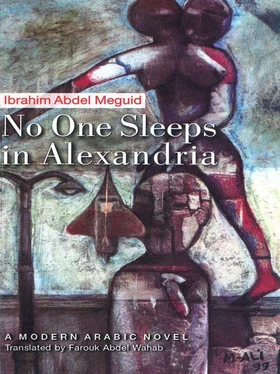Shamm al-Nasim (the spring festival) and the other feasts were over. Finally Norway surrendered, and the Allies were beaten. The world waited with bated breath for Germany’s next blow. The German battle cruisers Scharnhorst and Grieisenau attacked the British aircraft carrier Glorious and sank it in less than ninety minutes. The Egyptian minister of national defense issued an order prohibiting marriage for second lieutenants in the Egyptian army so they would not be distracted from military affairs by family obligations. Opening Marsa Matruh as a summer resort was postponed indefinitely this season, in view of the war and because there was no place for people to stay anyway. The United States began exporting to the Allies the fighter jet Bell Airacobra, which flew at a speed of seven hundred kilometers an hour, at a price of twenty thousand pounds apiece. Fishing was banned in the western harbor in Alexandria, just as swimming had been banned in Anfushi earlier. General Baker Pasha, Alexandria’s police superintendent, issued orders declaring May eighth an emergency day, so air-raid drills were conducted as were mock rescue operations. There was a call for volunteers to be trained, and the locations of public shelters and their capacities in the neighborhoods of Gumruk, Manshiya, Labban, Attarin, Mina al-Basal, and Muharram Bey were announced. Fifty prominent figures in the city of Sydney, Australia, agreed to a proposal to give, free of charge, tracts of land in the northwestern part of the continent to the Jewish Colonization Society for Jews fleeing Europe. The police superintendent’s office in Cairo formed a six-hundred-man force of different ranks from the police and the army and placed it at the disposal of the political section. The dawn of the tenth of May brought the world the news it was afraid would happen one day. The Germans struck their biggest blow: their armies invaded the Netherlands and Belgium and part of France. The invasion of Norway was accomplished, and the world realized that the most horrific military revival in human history had taken place in Germany, which was now spreading terror everywhere in Europe. Mr. Chamberlain resigned, and Winston Churchill formed the new cabinet and stood in the House of Commons to say that his policy would be to wage war from the sea, the land, and the air, that the goal was one word: victory. King Farouk unveiled a statue of Mustafa Kamil, a young king dedicating the statue of a young leader. The newspapers published his now famous words, “Free in our land, hospitable to our guests. My soul, forged from the shining light of patriotism, cannot live in the dark of oppression and despotism.” Preparations were begun to evacuate Alexandrians, if necessary, to the Bihayra governorate. The world discovered that Germany had deployed 126 divisions in its invasion of France. The Netherlands surrendered, since resistance was futile. Queen Wilhelmina broadcast a speech in English, in which she said that all prayers for détente and understanding had been in vain, that her nation had been defeated because of the enemy’s superior forces, but that it would not be defeated morally, that the Dutch spirit would remain sound and strong. The newspapers in Egypt announced a new line of defense, comprising the Delta from Alexandria to Port Said as well as Cairo, and it turned out to be a line of defense coverage offered by a life insurance policy sold by the Sun Life Insurance Company. The area around the Muhammad Ali barrages was closed to the public as of May 15. The pricing commission of Alexandria met at the city hall to set the prices of staple goods and decided to keep the current price structure in place, with the exception of the price of matches, which was raised. The Postal Authority issued a five-millieme commemorative stamp bearing a picture of the year-and-a-half-old Princess Faryal. The Germans were able to open a fifty-mile-wide breach in the French lines of defense. Through it they placed their armored divisions sixty miles behind French army lines, thus encircling about half a million French soldiers behind the Maginot line, which the Germans did not attack directly, but in which they opened two breaches and went around it. The Belgian army laid down its arms after losing three quarters of a million of its men. In Alexandria foreign nightclub artistes were deported on a boat, and it was announced that all foreign artistes would be deported for fear that they might be recruited as spies. The number of English recreational women members of the ATS (Auxiliary Territorial Service) in Alexandria and Cairo increased. A special camp was set up for them on the Mustafa Kamil section of the beach and anyone who wished could get close and watch them in their swimsuits. Some malicious liars even said that sometimes they went into the water without said swimsuits. The first evacuation from Alexandria took place when a thousand orphan children were evacuated to orphanages in Mahalla al-Kubra and Mansura. A man in whose possession were papers written in code was arrested and taken under guard to the main police headquarters in Cairo. There was only one merchant in Alexandria who violated the official pricing code, only one burglary, of a jewelry store in the goldsmiths’ row. There were fifty traffic violations and one attempted murder. Britain was now like a dignified man with his pants down, trying desperately to pull them up but failing to, then finally managing to do it, after his heart had almost stopped. Britain had to withdraw its forces from France with the least possible losses, and it did manage to evacuate the troops from Dunkirk and Calais and other locations using all available vessels, big and small, and volunteer boats— the biggest escape operation by sea in history with about four hundred thousand soldiers evacuated back to their island under German bombardment on land and sea. Magd al-Din would read the news to Dimyan, who could not believe that human beings could wreak so much destruction. Dimyan asked him, are people in Europe human like us, or or are they devils? How could the Earth bear all of this without exploding? When Dimyan saw a picture of Laurel and Hardy, he asked Magd al-Din about the name of the film. He told him it was The Air Devils, and Dimyan suggested that they watch it together, give up a lunch or a supper and watch it, so long as the cinema was not screening any Chaplin films.
Magd al-Din was surprised at the idea, and Dimyan asked him if the cinema was proscribed in Islam, and Magd al-Din said he didn’t mean it like that, but that he thought if he ever got into a movie theater he wouldn’t be able to get out of it. Dimyan, who had become like a meek little child since going to church and confessing and praying to Mari Girgis, laughed.
The raids of Paris had begun to intensify and the world waited with bated breath. Was Hitler going to enter Paris? Was the most beautiful city in the world about to fall? The newspapers published the poem written by the Egyptian poet Ahmad Shawqi after the end of the Great War:
You are the beauty and majesty of this epoch
The very cornerstone of its solid edifice
The people of the epoch have taken up the banner of right from you
Its civilization marched on in the light of your sons.
The situation in France appeared quite bleak. A German armored division captured eight thousand British and four thousand French soldiers. That armored division was under the command of an intelligent German soldier whose name, Erwin Rommel, would become very familiar to Egyptians later on. His panzer division was nicknamed “the phantom division” and was the spearhead that penetrated the Somme, advancing toward the Seine, capturing all the French and English troops in its way until Rommel occupied Cherbourg which, together with its troops numbering thirty thousand, surrendered to him. The roads in France were filled with refugees chased by the machine guns of German planes. The French army collapsed and De Gaulle was appointed undersecretary for national defense. The Soviet Union seized the Baltic republics. But who had the time to think about that? Paris fell, and the people’s hearts were wrenched by the horrors of war. Camilla wept, and when Zahra saw her she figured that Paris must be something so big as to cause Camilla to cry. Camilla said her life’s dream was to travel to Paris one day and that she could not believe that the capital of beauty could fall.
Читать дальше












